Monstera deliciosa, a popular plant known for its large, shiny, dark green leaves, can become dull and dusty over time, hindering the plant’s ability to photosynthesize and grow healthy new leaves.
Regular cleaning of your Monstera leaves is essential to keep them looking great and to promote the plant’s overall health.
Table of Contents
Why Clean Monstera Leaves?
Cleaning your Monstera leaves should be a regular part of your plant care routine. Monstera plants use their leaves to capture and convert sunlight into energy, and layers of dust and dirt can block sunlight from reaching the leaf surface. This can cause the plant to struggle and slow its growth.
Additionally, dust buildup can clog the tiny pores on the leaves, which can lead to poor transpiration and root rot.
How to Clean Monstera Leaves
The best method for cleaning your Monstera leaves depends on the size of your plant. Here are some options for different sized plants:
Small Monstera plants
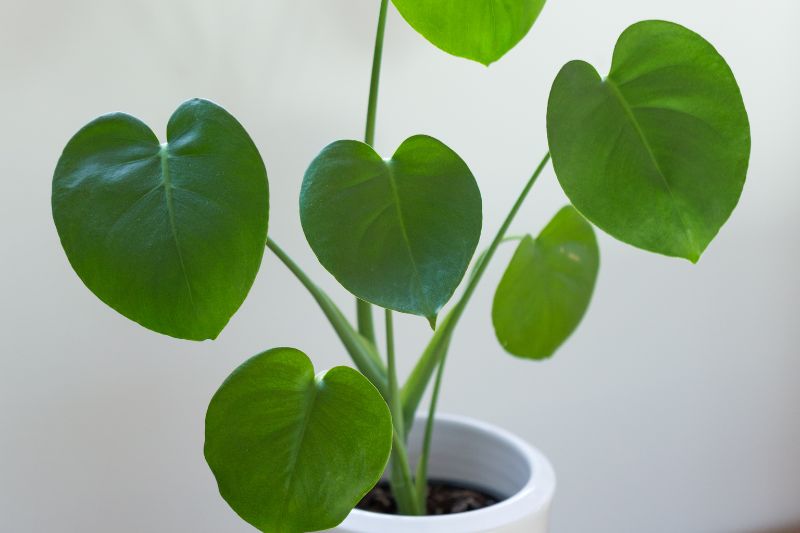
Use the dunking method by immersing the leaves in tepid water and gently agitating them to remove dust or grime. Ensure you hold the soil in place while doing so. After a few minutes, remove the plant from the water and leave it to dry.
Medium Monstera plants
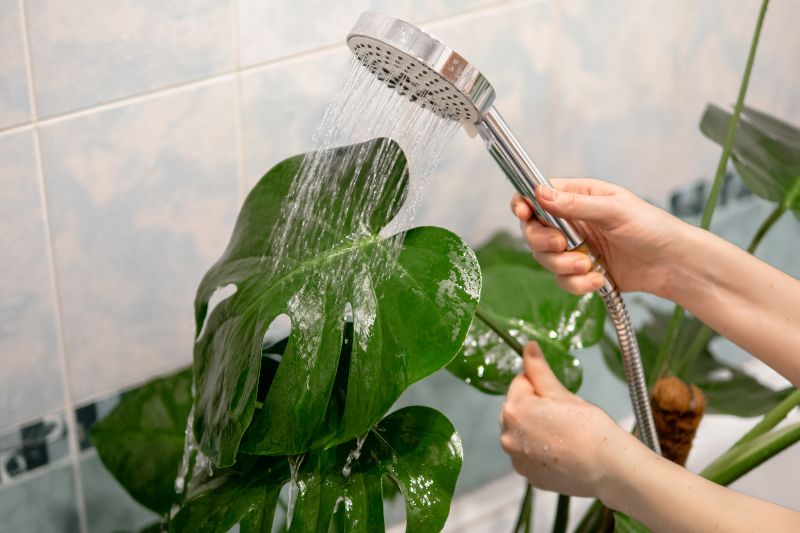
For plants too big to be turned upside down, use the showering method. Place your plant in a lukewarm shower for a few minutes to wash the leaves, ensuring the water temperature is correct to prevent damage. Use a low-pressure setting on your showerhead to avoid harming the tender leaves.
Avoid this method if your Monstera is in a pot with poor drainage, as excess water can cause root rot.
Large Monstera plants
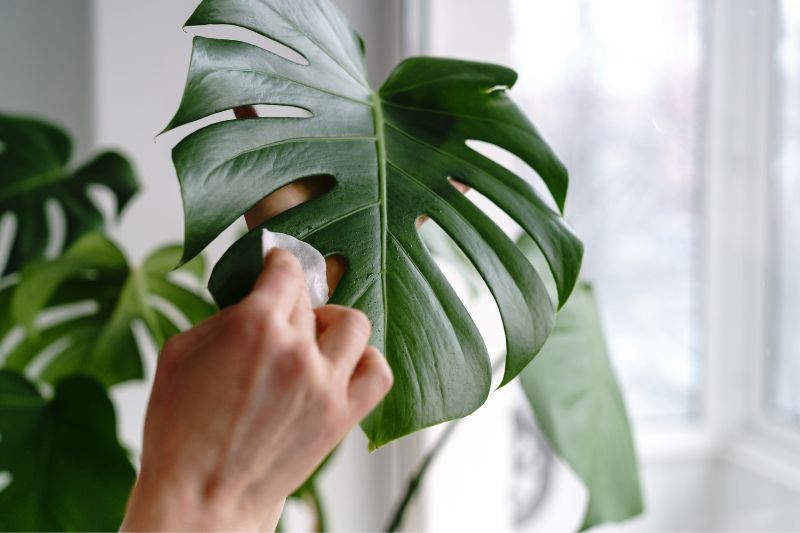
If your Monstera is too large to move, wipe down the leaves manually with a small bucket of lukewarm water and a microfiber cloth or use a spray bottle to moisten the leaves. Start at the top of the plant and work your way down, making sure to clean the undersides of the leaves as well.
For medium and large plants, you can also use a diluted mixture of warm, soapy water with a few drops of gentle dish soap to scrub the leaves before rinsing with lukewarm water and wiping dry.
Additional Tips for Cleaning Monstera Leaves
- Avoid using leaf shine products or harsh chemicals, such as undiluted vinegar or lemon juice, as they can clog the pores on your Monstera’s leaves or damage them.
- Regularly inspect your plant for pests and signs of infestation.
- Don’t forget to clean the undersides of leaves, where dust and debris can accumulate.
- Use caution when cleaning damaged leaves, as they may be more fragile and prone to further damage.
- Consider using a humidifier in the room where your Monstera is located to help keep the plant healthy and prevent dust buildup.
- Mist the leaves with a spray bottle filled with filtered water every day to remove dust buildup and maintain optimal moisture levels.
- Trim any dying leaves with sterilized gardening shears to prevent the spread of disease and improve the overall health of the plant.
How Often to Clean Monstera Leaves
It’s recommended to clean Monstera leaves every two to four weeks. However, if you notice dust buildup on the leaves before that time, you should clean them sooner. Regular cleaning can help keep your Monstera looking great and growing healthy new leaves.
Final Thoughts
In summary, cleaning your Monstera leaves is an essential part of plant care that can help keep your plant healthy and looking its best. Choose the best cleaning method for your plant’s size, and be sure to clean the undersides of leaves and inspect your plant regularly for pests.
By following these simple tips and incorporating them into your regular plant care routine, you can ensure that your Monstera will continue to thrive and bring joy to your home for years to come.

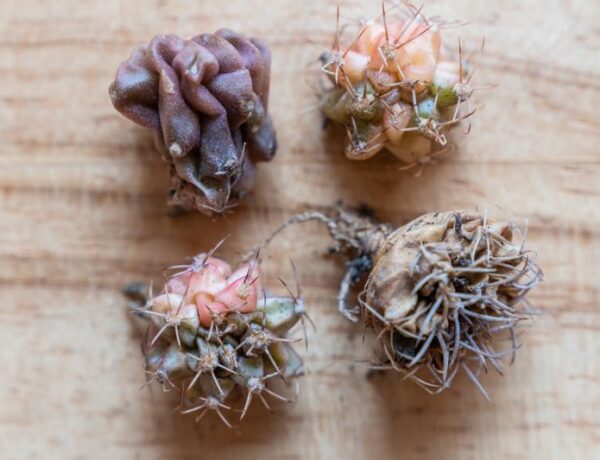
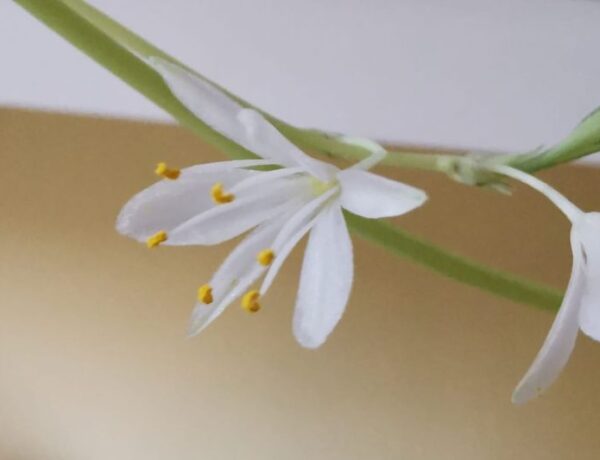
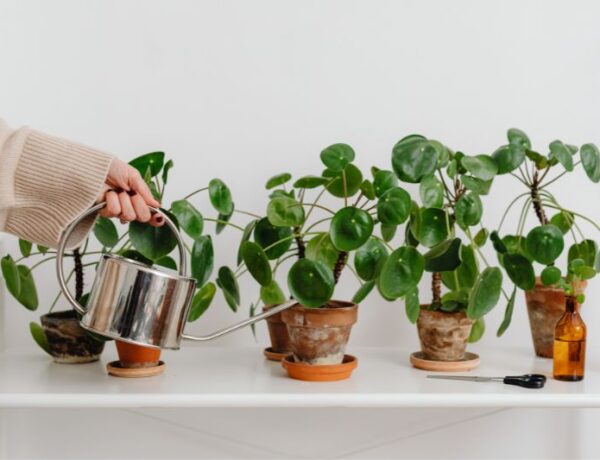


No Comments